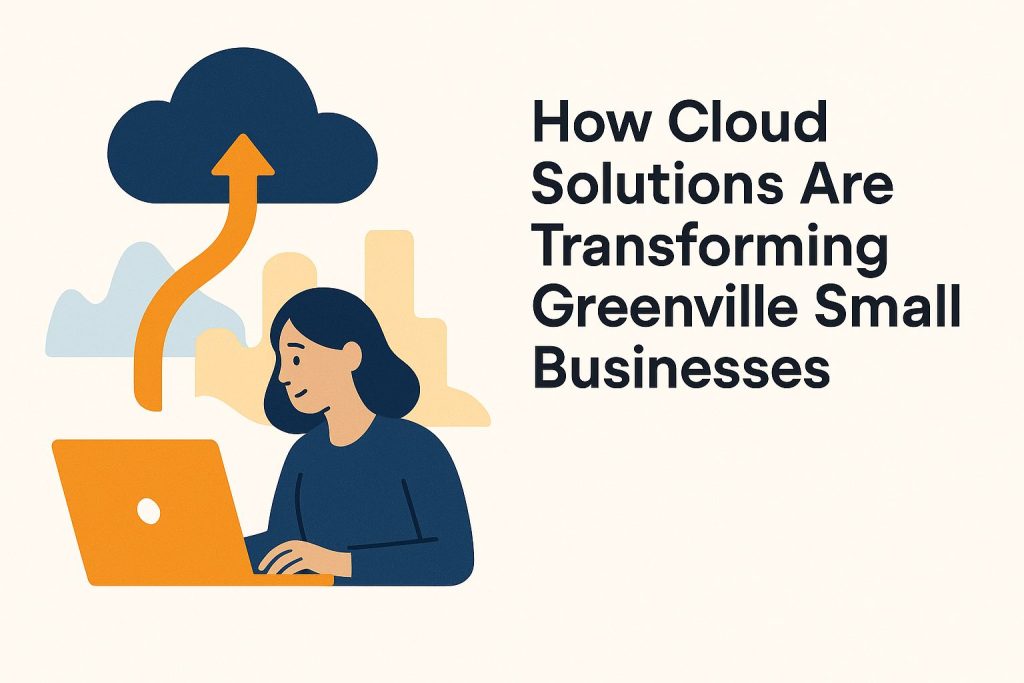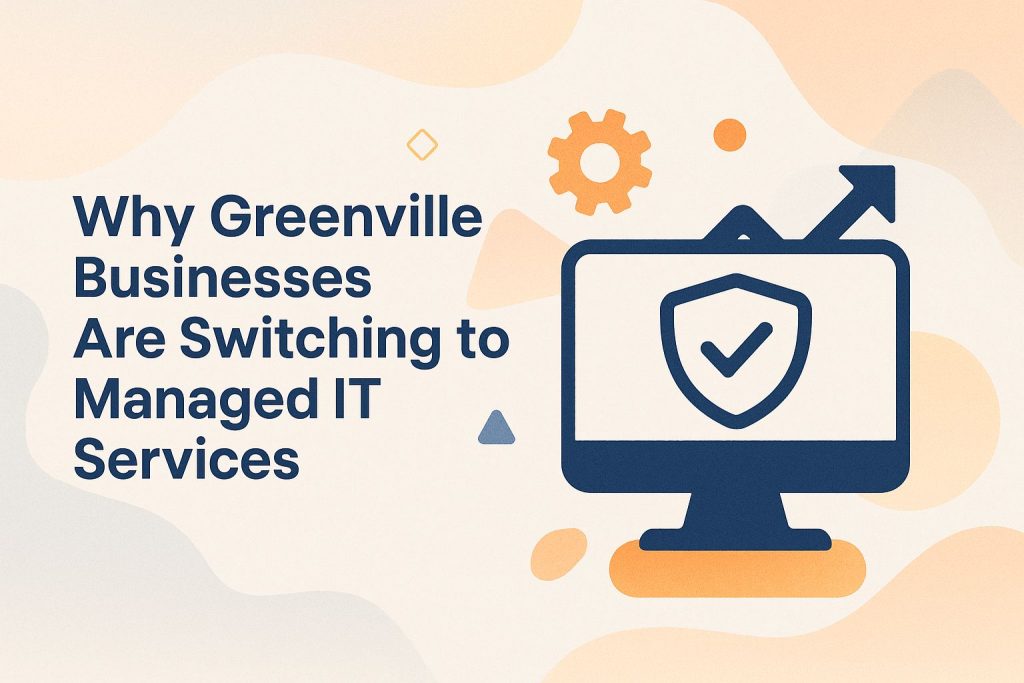Exploring Cloud IT Services for Greenville Businesses
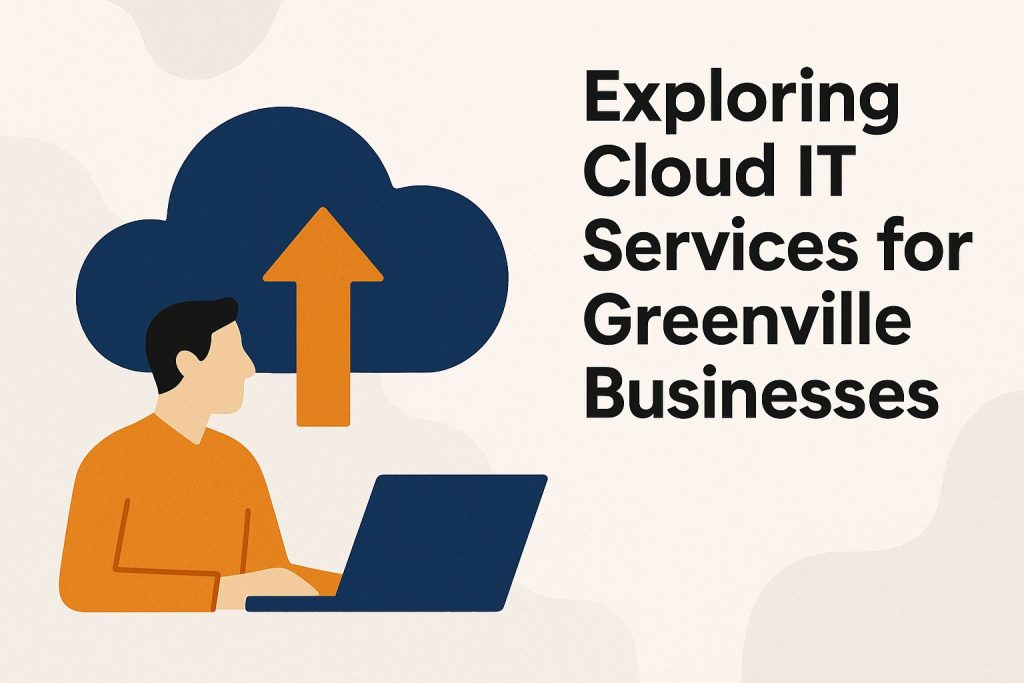
Greenville businesses must use technology to stay competitive. Cloud IT services help businesses save money and grow. This article covers cloud services like IaaS, PaaS, and SaaS. It also gives tips on choosing a provider and planning for the future. The journey into cloud IT services promises valuable knowledge for local enterprises aiming to thrive in a technology-driven market, promoting digital transformation and IT modernization.
Benefits for Greenville Businesses
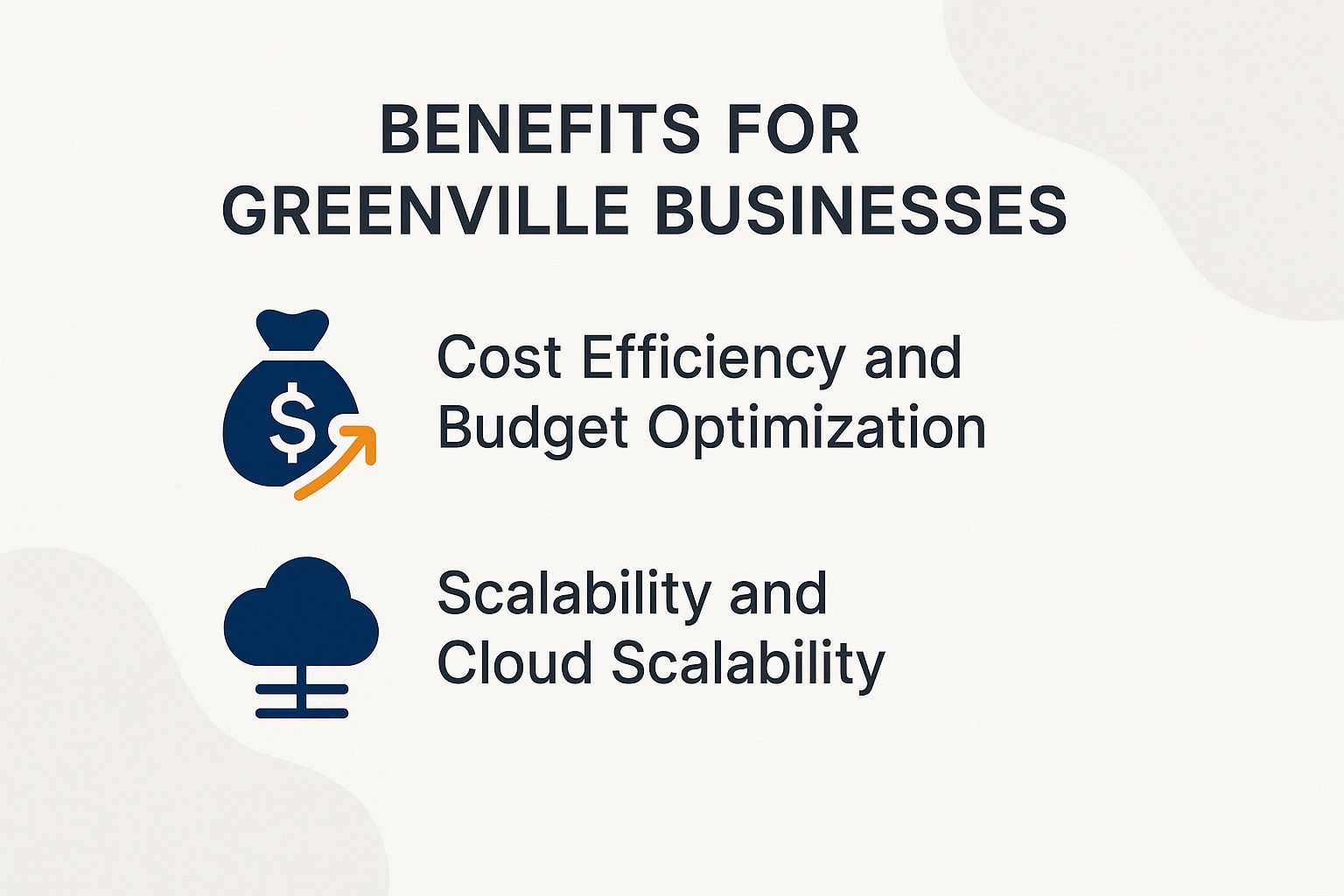
Greenville businesses use cloud IT services to save money and grow. These services help them stay operational and efficient. As mentioned in our analysis of how Greenville companies leverage cloud computing for growth, these technologies are crucial in maintaining a competitive edge.
Cost Efficiency and Budget Optimization
Cloud services can reduce costs by up to 30%. This leads to significant annual savings, as shown by a Gartner study.
This cost reduction is primarily attributed to the decreased need for physical hardware and maintenance.
For example, companies can bypass the significant upfront expenses associated with purchasing servers.
Instead, they can leverage services such as Amazon Web Services (AWS) or Microsoft Azure, which operate on a pay-as-you-go model, supporting cloud migration and virtualization.
This approach minimizes ongoing expenses, as cloud providers manage updates and security, effectively eliminating the necessity for dedicated IT personnel.
This helps businesses save thousands of dollars each year.
Scalability and Cloud Scalability
Cloud computing helps businesses quickly adjust their resources. This can improve agility by 40%. It offers flexibility to increase or decrease capacity based on demand.
Infrastructure as a Service (IaaS) solutions such as AWS and Azure provide organizations with the tools necessary to swiftly adapt to evolving needs. For example, a growing e-commerce company can utilize AWS’s Elastic Compute Cloud to scale its server capacity during peak holiday seasons, automatically adjusting resources in response to traffic fluctuations.
In a similar vein, a fintech startup may leverage Azure’s virtual machines to enhance its data processing capabilities, improving performance without incurring substantial upfront costs, supporting data privacy and analytics.
Furthermore, these platforms offer robust monitoring tools like AWS CloudWatch and Azure Monitor, enabling businesses to track usage and optimize expenditures in real time.
Types of Cloud Services and Managed Services
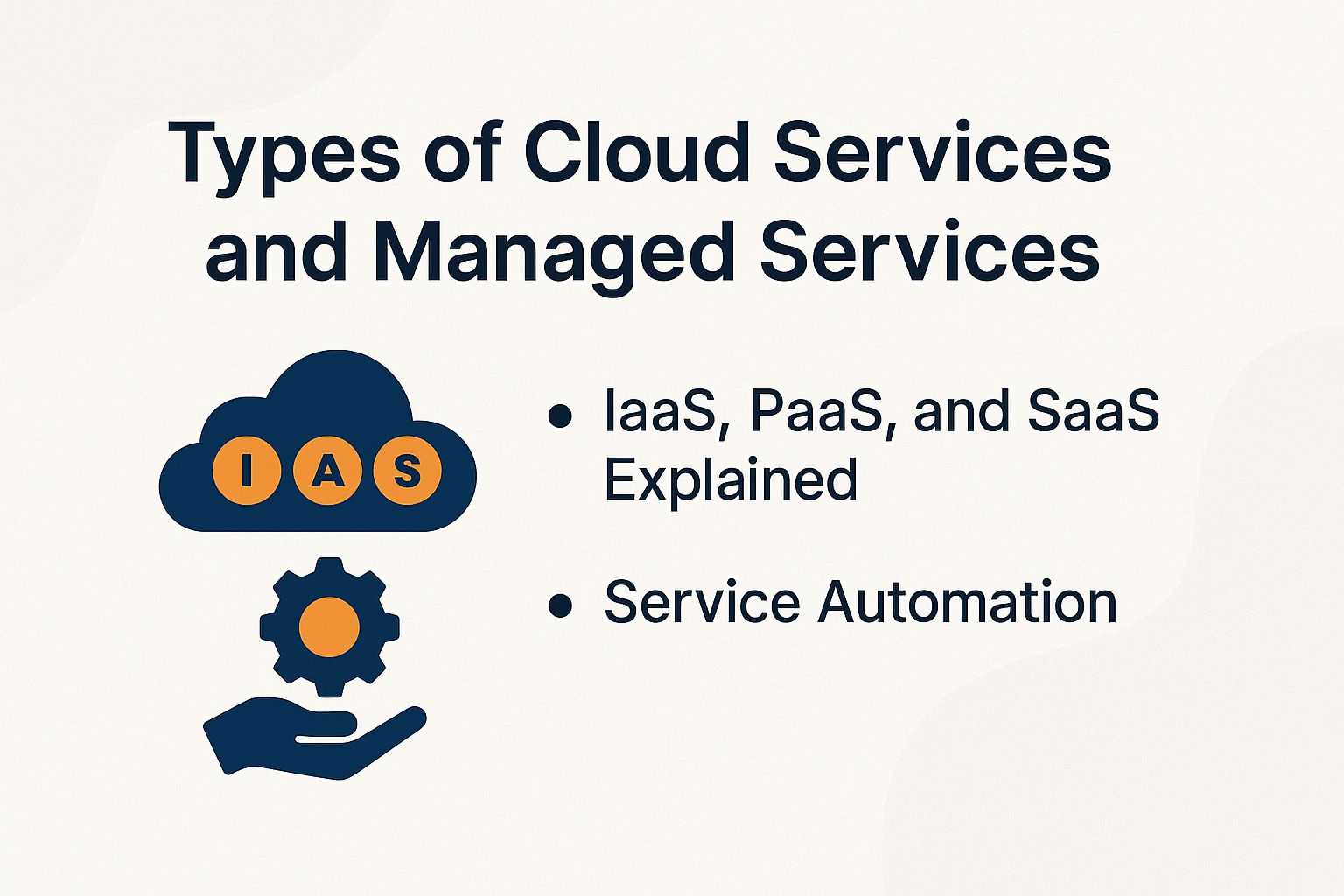
Understanding cloud services like IaaS, PaaS, and SaaS is important for Greenville businesses to improve their IT strategies. Those curious about optimizing their IT service management can explore our guide to choosing the right managed IT services in Greenville.
IaaS, PaaS, and SaaS Explained and Service Automation
IaaS (Infrastructure as a Service) provides virtualized computing resources over the internet. PaaS (Platform as a Service) allows developers to build applications without managing the underlying infrastructure, facilitating application hosting and IT strategy.
SaaS (Software as a Service) delivers software solutions on a subscription basis.
For example, a local retail business may utilize AWS for its IaaS needs to host its website, allowing for scalability as traffic increases.
In the case of PaaS, Google App Engine could be utilized to develop a custom inventory management application, facilitating easy updates without the complexities of server management.
Regarding SaaS, services such as Salesforce are employed to manage customer relationships effectively and streamline sales processes.
Cloud service models meet various business needs. They help organizations choose solutions that fit their operations and budgets.
Choosing the Right Provider and Vendor Management
Choosing the right cloud provider is vital for businesses. It affects service quality, support, and efficiency.
Organizations should first check compliance with regulations like GDPR or HIPAA. This depends on their industry. Subsequently, a thorough examination of service level agreements (SLAs) is necessary to ensure they meet the required uptime and performance standards.
Reliable customer support is important. Choose providers that offer 24/7 help through various channels, enhancing IT support and service level agreements (SLA).
A comparative analysis of at least three potential providers based on these criteria will help identify the one that best aligns with the organization’s requirements and budget.
Implementation Strategies and Technical Support
Successful cloud IT implementation needs a structured approach. This minimizes disruption and maximizes benefits through managed cloud services and IT consulting.
Organizations should first assess their current infrastructure. Identify workloads suitable for cloud migration to the cloud. Tools such as CloudEndure can facilitate this process by creating live replicas of applications, ensuring a seamless transition.
After the assessment, select cloud services that fit specific organizational needs. For example, AWS is recognized for its scalability, while Google Cloud is particularly strong in data analytics.
Investing in staff training is vital. This ensures they can manage cloud environments effectively, including user training and development.
This comprehensive approach generally results in smoother transitions and enhanced operational efficiency.
Future Trends in Cloud IT and Digital Services
Businesses must track new trends in cloud IT. This includes edge computing, AI integration, and IoT to improve operations and stay competitive.
Organizations should use hybrid cloud solutions. These combine on-premises and cloud resources for more flexibility.
For example, using platforms like Microsoft Azure and AWS helps companies scale resources based on demand fluctuations. Furthermore, investing in strong cybersecurity measures is essential. This includes zero-trust architecture and monitoring tools to protect data. Curious about top remote work security solutions for businesses? Ensuring data safety remains a priority.
Statistics show the hybrid cloud market will grow by 18% each year. Organizations must adapt their strategies to stay competitive, leveraging cloud trends and innovation.
Frequently Asked Questions
What are Cloud IT services and how can they benefit Greenville businesses with IT governance?
Cloud IT services provide computing resources like servers, networks, storage, and applications over the internet. These services help Greenville businesses with cost-effective and scalable solutions for data storage, security, and applications.
What types of Cloud IT services are available for Greenville businesses?
The main types of Cloud IT services are: Infrastructure as a Service (IaaS), Platform as a Service (PaaS), and Software as a Service (SaaS). IaaS provides virtualized computing resources, PaaS provides a platform for developing and deploying applications, and SaaS offers access to software applications over the internet.
How can Cloud IT services help Greenville businesses improve their data security and IT compliance?
Cloud IT services offer secure data storage and management, as well as advanced security features such as data encryption and access control. Migrating to the cloud helps Greenville businesses reduce the risk of data breaches and protects sensitive information.
What are the cost implications of using Cloud IT services for Greenville businesses?
The cost of Cloud IT services for Greenville businesses varies. It depends on the type and amount of services needed. However, overall, cloud services offer a cost-effective solution as they remove the need for expensive hardware and infrastructure. Additionally, businesses pay only for the resources they use. This makes cloud services scalable and flexible.
What factors should Greenville businesses consider when choosing a Cloud IT service provider with managed services?
When choosing a Cloud IT provider, Greenville businesses should consider security, data storage, pricing, customer support, and the provider’s reputation. It is important to carefully research and compare different providers to find the best fit for your business needs.
What steps should Greenville businesses take to ensure a smooth transition to the cloud and enhance IT strategy?
To ensure a smooth cloud transition, Greenville businesses should assess their current IT infrastructure. Identify which processes and applications can move to the cloud. Next, create a migration plan. Test the new system and train employees on using the cloud services. It is also important to have a backup plan for any issues during migration.
